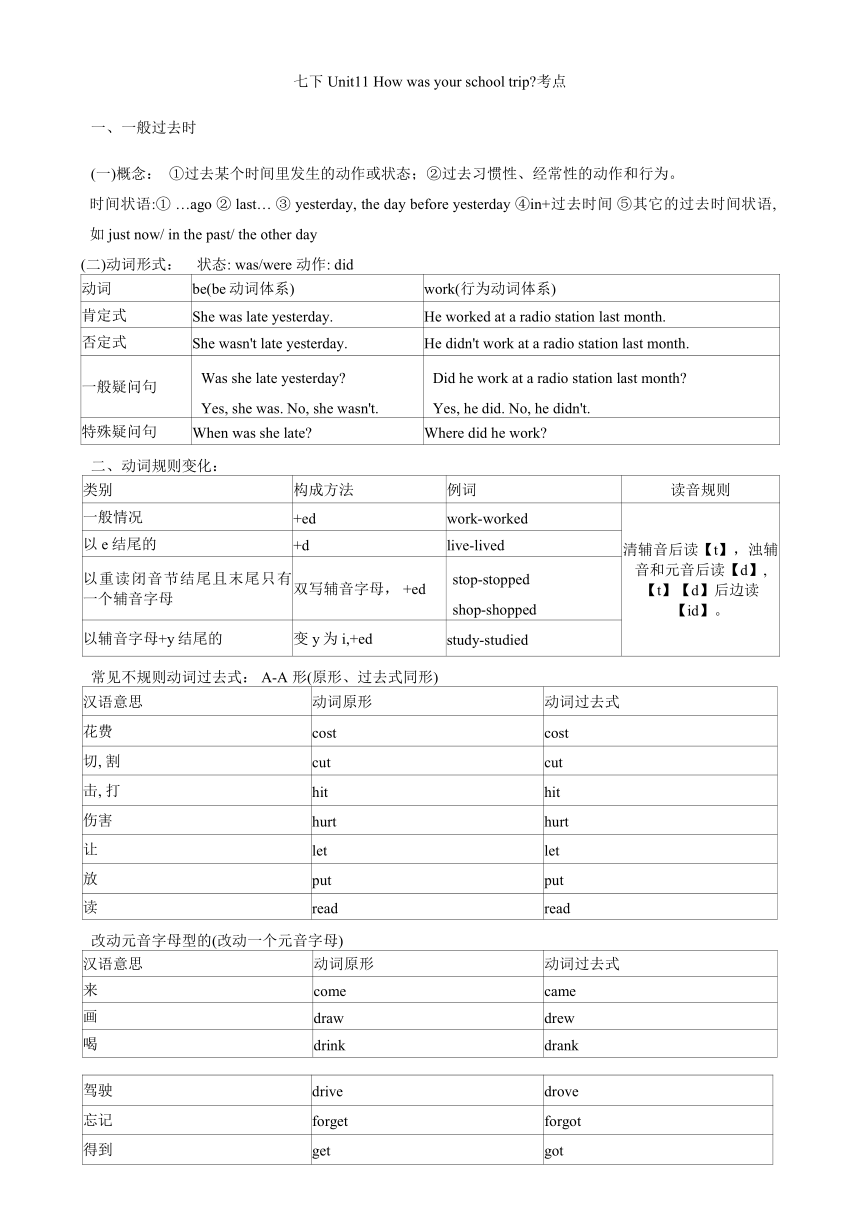
七下 Unit11 How was your school trip 考点 一、一般过去时 (一)概念: ①过去某个时间里发生的动作或状态;②过去习惯性、经常性的动作和行为。 时间状语:① …ago ② last… ③ yesterday, the day before yesterday ④in+过去时间 ⑤其它的过去时间状语, 如 just now/ in the past/ the other day (二)动词形式: 状态: was/were 动作: did 动词 be(be动词体系) work(行为动词体系) 肯定式 She was late yesterday. He worked at a radio station last month. 否定式 She wasn't late yesterday. He didn't work at a radio station last month. 一般疑问句 Was she late yesterday Yes, she was. No, she wasn't. Did he work at a radio station last month Yes, he did. No, he didn't. 特殊疑问句 When was she late Where did he work 二、动词规则变化: 类别 构成方法 例词 读音规则 一般情况 +ed work-worked 清辅音后读【t】,浊辅音和元音后读【d】, 【t】【d】后边读【id】。 以e结尾的 +d live-lived 以重读闭音节结尾且末尾只有一个辅音字母 双写辅音字母, +ed stop-stopped shop-shopped 以辅音字母+y结尾的 变 y为i,+ed study-studied 常见不规则动词过去式: A-A 形(原形、过去式同形) 汉语意思 动词原形 动词过去式 花费 cost cost 切, 割 cut cut 击, 打 hit hit 伤害 hurt hurt 让 let let 放 put put 读 read read 改动元音字母型的(改动一个元音字母) 汉语意思 动词原形 动词过去式 来 come came 画 draw drew 喝 drink drank 驾驶 drive drove 忘记 forget forgot 得到 get got 生长 grow grew 知道 know knew 骑乘 ride rode 跑 run ran 坐 sit sat 唱歌 sing sang 游泳 swim swam 醒来 wake woke 写 write wrote A-B型(完全不一样) 汉语意思 原形 过去式 是 am/is 、are was/were 带来 bring brought 买 buy bought 做 do/does did 吃 eat ate 喂养 feed fed 感觉 feel felt 打架, 吵架, 战斗 fight fought 找到, 发现 find found 飞 fly flew 去 go went 有 have/has had 听见 hear heard 保持 keep kept 离开 leave left 失去 lose lost 做, 制作 make made 见面 meet met 付费 pay paid 说 say said 看见 see saw 卖 sell sold 睡觉 sleep slept 说 speak spoke 花费, 度过 spend spent 站 stand stood 带走, 花费 take took 教 teach taught 告诉 tell told 思考, 认为 think thought 穿 wear wore 三、重点知识 Section A 知识梳理 1. fed chickens I feed my dog every day. 我每天都喂我的狗。 feed的常见用法 (1) feed sth. to sb./sth.“把某物喂给某人或者某人” Please feed some grass to the cow.请喂些草给牛吃。 (2) feed on“以…为生、 以…为食” Sheep feed on grass. 羊以草为食 (3) feed…on/with…“用……喂……” He feeds the dog on meat. 他用肉喂狗。 2. quite quite常修饰形容词,副词或动词,very 常修饰形容词或副词 quite a/an+形容词+可数名词单数=a very+形容词+可数名词单数 It's quite/ very noisy outside.外面很吵。 The singer is quite/very popular with young people. 这位歌手很受年轻人的欢迎。 He lives in quite a large house.=He lives in a very large house. 他住在一个很大的房子里。 quite a lot 许多若其后接名词, 则用“quite a lot of... It rains quite a lot here in June. 这里六月雨下得很多。 I bought quite a lot of potatoes this morning. 我今天早上买了很多土豆。 3. Did you grow any apples grow意为“种植、栽培”,后接名词或者代词作宾语。 We grow flowers and vegetables on our garden. 我们在花园里种花种菜 ... ...
~~ 您好,已阅读到文档的结尾了 ~~